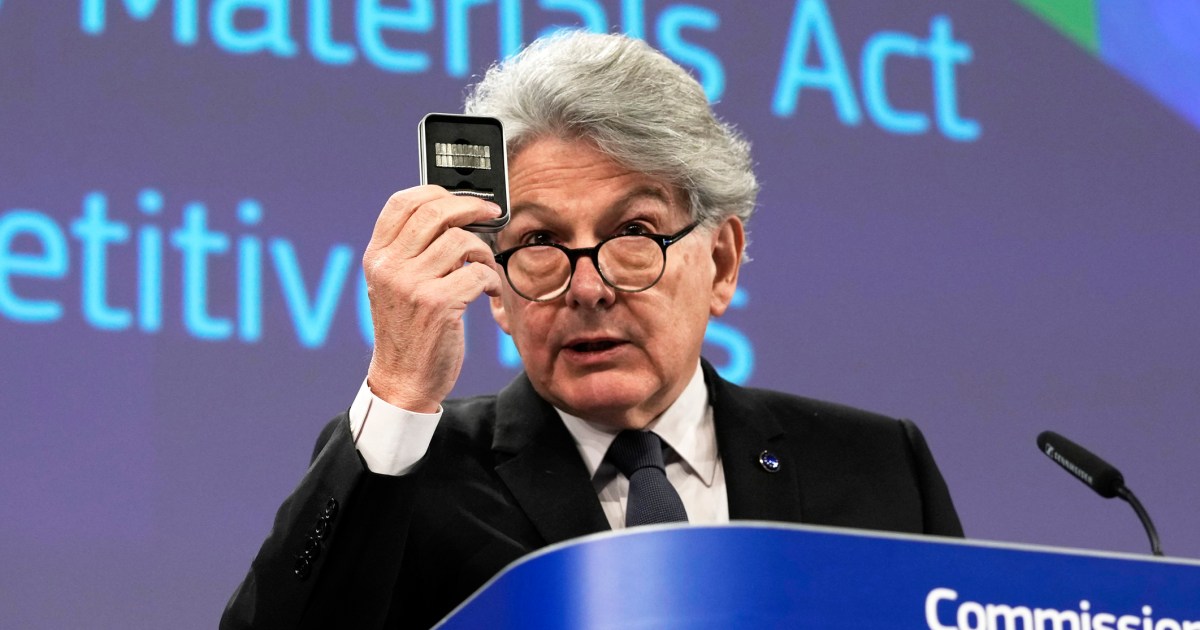BRUSSELS — The European Union presented plans Thursday to fundamentally revamp its policies on promoting green technologies and dealing with critical raw materials, imposing limits on imports from countries like China while unleashing subsidies and other financial incentives to ramp up home production.
The plans by the European Commission, the E.U.’s executive arm, are essential in moving toward a climate neutral economy, while also increasing the bloc’s strategic independence in a shifting world of geopolitical alliances.
To achieve its clean technology and strategic goals, the E.U. is making a major economic turn away from the decades of preaching the hands-off free-market economic gospel where any public policy input was considered meddling reminiscent of a bygone age. Now, the plans again call for accommodating state aid, a guiding hand, and financial incentives as key ingredients to move from a fossil fuel to a green economy.
“The one mistake I think we’ve made — and the one mistake which would be old-fashioned industry politics — would be to have no industry politics. And that’s what we had for too long in Europe, thinking that the market would take care of everything itself,” said E.U. Commission Vice President Frans Timmermans.
And eying China’s state-managed economy, he said that Beijing has taken the lead in the green and clean tech sectors that will dominate the global economy. Now, the E.U. gets 98% of its rare earth materials and 93% of magnesium from China. “We now understand that the strategic choices China made a decade ago are now coming home to roost. And we also have to make our own strategic decisions now for the decades to come.”
The lynchpin in the proposal is a commitment to produce at least 40% of the clean tech needed by 2030 in the 27-nation bloc, while at the same time ensuring that not more than 65% of consumption of any strategic raw material comes from a single third country — in practice, often China.
On top of that, the plan foresees that financial incentives from member states will be welcomed much more and get faster approval. “It’s not old-fashioned. It’s what you need to do when you’re in the middle of an industrial revolution.”
Standing besides Timmermans, the E.U.’s Internal Market Commissioner Thierry Breton could only say: “music to my ears.”
The E.U.’s move also comes after the $375 billion U.S. Inflation Reduction Act of last summer, when President Biden pushed through an incentives-laden and America-first clean energy law. After months of vehement protests on measures that would keep out E.U. products, the bloc has accepted a truce and Thursday’s plans for the Net Zero Industry Act and the Critical Raw Materials Act underscored that joining with a similar program was better than being beaten by it.
“I don’t agree at all on the fact that we lost the subsidy race,” said Breton. “This is why I said we are in motion … And I believe this is what we did today.” The plans still need to be approved by the E.U.’s 27 member states and the parliament, a process that is set to take many months, perhaps over a year.
The stakes are massive. The E.U. estimates that by the end of the decade the clean technology global market will be worth 600 billion euros a year. Also that the deployment of renewables will quadruple by 2050, the use of heat pumps will increase 6-fold by 2050, and that production of electric vehicles will increase 15-fold.
Because state aid and many incentives come from the member states themselves and the E.U. has to approve them through relaxed regulation, the plans did not present exact overall estimates.
At a geopolitical level, the stakes are no less great, and this is where the Critical Raw Materials Act comes in. Overall, these are used in anything from solar panels to heat pumps and electric cars.
With incentives, the E.U. Commission wants by the end of the decade that at least 10% of the consumption of strategic raw materials is locally mined and at least 40% locally processed.
At the same time as seeking to disengage from Chinese dependency by putting quotas on imports, the E.U. is seeking to build up a select Critical Raw Materials Club of alliances, with the likes of the United States and Canada, to further cement the Western bloc in an increasingly unstable global environment.
“We’re strengthening our cooperation with reliable trading partners globally to reduce the E.U.’s current dependencies on just one or a few countries,” European Commission President Ursula von der Leyen said.

